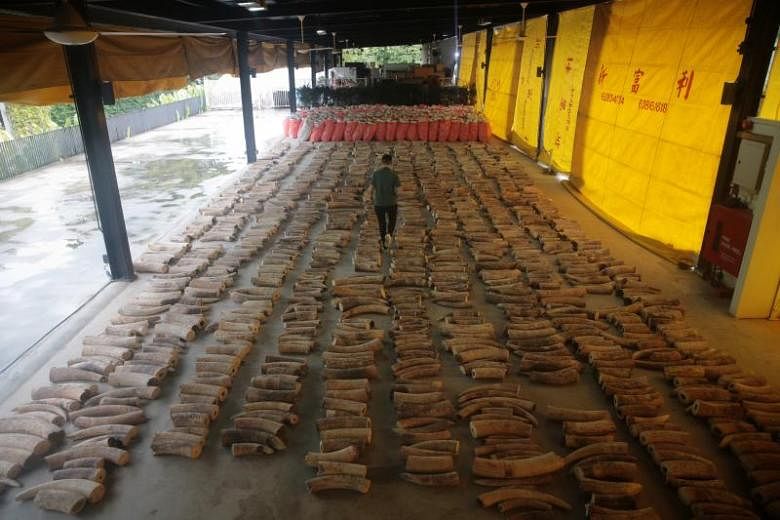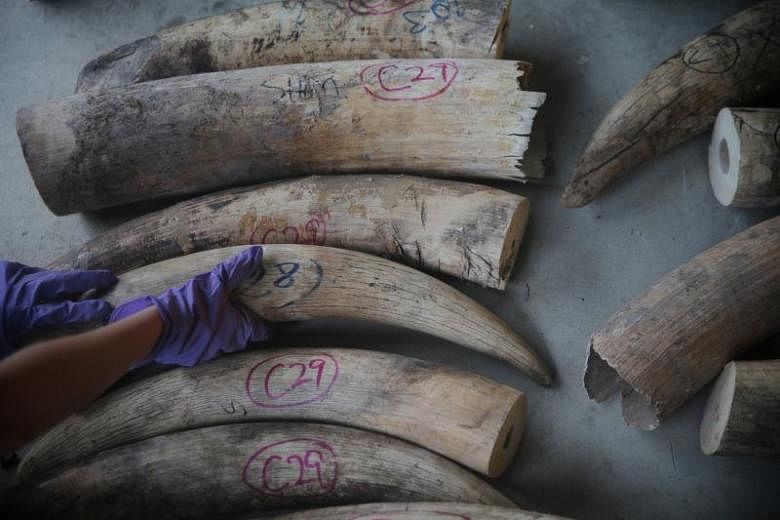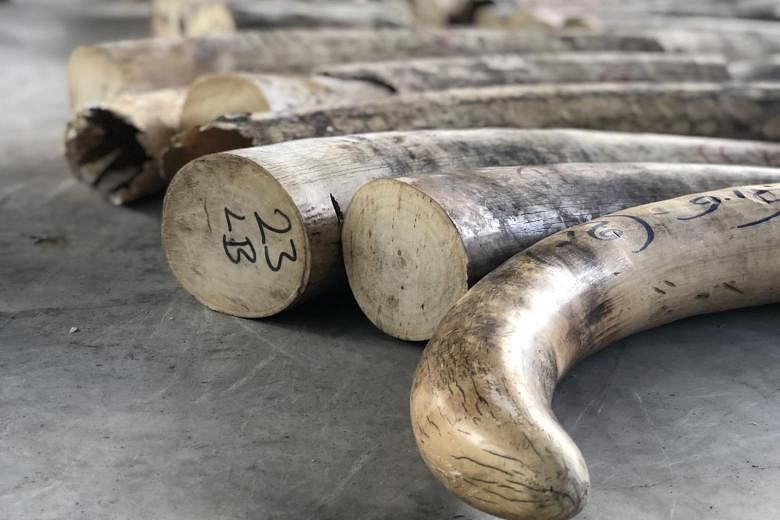SINGAPORE - A record 8.8 tonnes of elephant ivory was seized from a shipment on Sunday night (July 21) in what is believed to be one of the largest seizures that the world has seen in recent years.
The ivory is estimated to have come from nearly 300 African elephants. Just three months earlier in April, Singapore seized 177kg of cut-up and carved elephant ivory.
Alongside the record ivory haul, 11.9 tonnes of pangolin scales were also confiscated in the operation. It was the third shipment to be intercepted this year, said the National Parks Board (NParks), Singapore Customs and the Immigration and Checkpoints Authority (ICA) in a joint statement.
The shipment, which was en route from the Democratic Republic of the Congo to Vietnam, was declared as containing "timber" but was found to contain pangolin scales estimated to be worth about $48.6 million, alongside $17.6 million worth of elephant ivory, when it was inspected by the authorities.
In April, two large shipments of pangolin scales - both bound for Vietnam from Nigeria - were intercepted by the local authorities within a week of each other. They were found to contain 12.9 tonnes and 12.7 tonnes of scales respectively.
With this seizure, Singapore has seized a total of 37.5 tonnes of pangolin scales since April.
The shipments were believed to be two of the largest single hauls the world has seen in recent years. The last one on record was in China, where 11.9 tonnes of scales were seized in 2017.
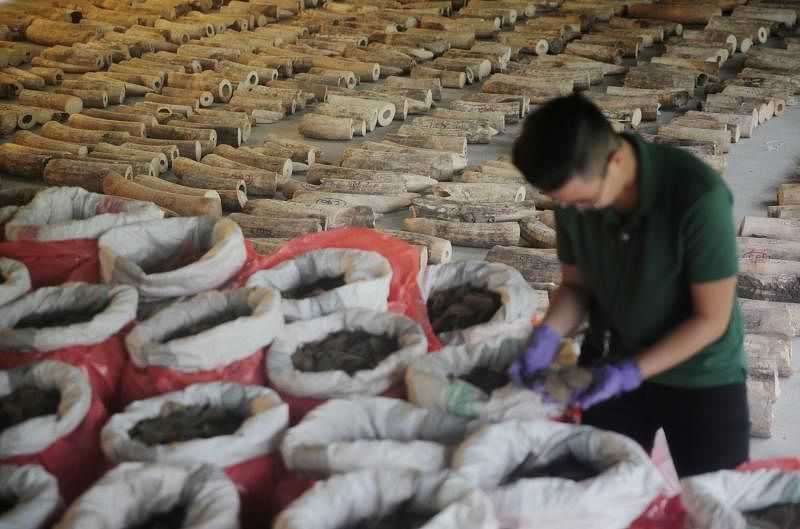
An estimated 2,000 giant pangolins (Smutsia gigantea) are believed to have been killed for the scales confiscated in the latest shipment.
The agencies said China's General Administration of Customs had shared information that enabled the successful seizure at Singapore's Pasir Panjang Export Inspection Station.
"The Singapore Government adopts a zero-tolerance stance on the use of Singapore as a conduit to smuggle endangered species and their parts and derivatives. Our agencies will continue to collaborate and maintain vigilance to tackle the illegal wildlife trade," they added.
Native to Asia and Africa, the ant-eating pangolin is the only mammal covered in scales and curls into a ball to defend itself from predators.
Pangolin scales, which are made of keratin, are in demand in Asia for use in traditional Chinese medicine despite there being no proven medicinal benefit from their use. Pangolin meat is also considered a delicacy in some cultures.
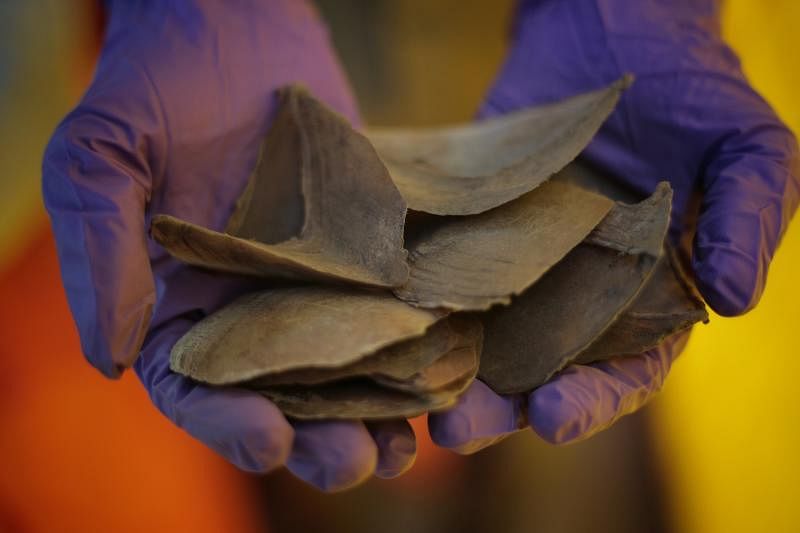
Experts who spoke to The Straits Times about the earlier seizures had said the large quantities of pangolins involved in the shipments pointed strongly to the involvement of criminal networks.
Ms Bridget Connelly, an analyst conducting research on wildlife trafficking with C4ADS - a non-profit based in the United States - told The Straits Times that only a trafficker with a significant source of funds can bear the financial risk of consolidating the animal parts from poachers and middlemen, and exporting them.
She added: "Wildlife trafficking is most efficient and cost-effective when it is done at scale. The poacher isn't going to have the means to ship the product to Asia, nor is the middleman, who may collect from several poachers."
The pangolin is believed to be the world's most trafficked mammal. There are eight species of pangolin, all of which are considered threatened with extinction on the International Union for Conservation of Nature's (IUCN) Red List of Threatened Species.
According to experts, over a million pangolins were taken from the wild between 2000 and 2013. Current populations of pangolins in Asia are thought to be low enough that traffickers have turned to African regions to feed the demand.
The Singapore authorities also intercepted the shipping of pangolin scales in Singapore in 2015 and 2016.
Ms Connelly pointed out that a key problem in stopping illegal wildlife trade was the lack of detection or, when detection occurred, the lack of sufficient penalties to deter traffickers.
"Often, even if wildlife traders are arrested, they will have minimal sentences or relatively small fines. Because of the high reward and low risk, the wildlife trade has continued to flourish," she said.
Singapore is a signatory to the Convention on International Trade in Endangered Species of Wild Fauna and Flora (Cites).
Under local laws - the Endangered Species (Import & Export) Act - the penalty for the illegal import, export and re-export of wildlife is a fine of up to $500,000 and may include two years' imprisonment.
Earlier this month, an international operation involving the police in 109 countries saw thousands of wild animals seized in a crackdown on illegal wildlife trade. Operation Thunderball, based in Singapore, was the third such Interpol mission in recent years aimed at transnational crime networks.
Ms Connelly said Singapore plays a significant role in international maritime trade routes and is heavily exposed to networks using its port to traffic wildlife products.
She said: "Because wildlife traffickers operate across jurisdictions, collaboration among international, regional and local actors at every stage in the supply chain is crucial to understanding and effectively disrupting the networks.
"When a seizure is made, it is important that consignee and consignor information is shared with the authorities in both the origin and destination jurisdictions as to more effectively prevent such shipments from being successful in the future."
The agencies said that the animal parts will be destroyed to prevent them from re-entering the market.
Correction note: This article has been edited for clarity.
